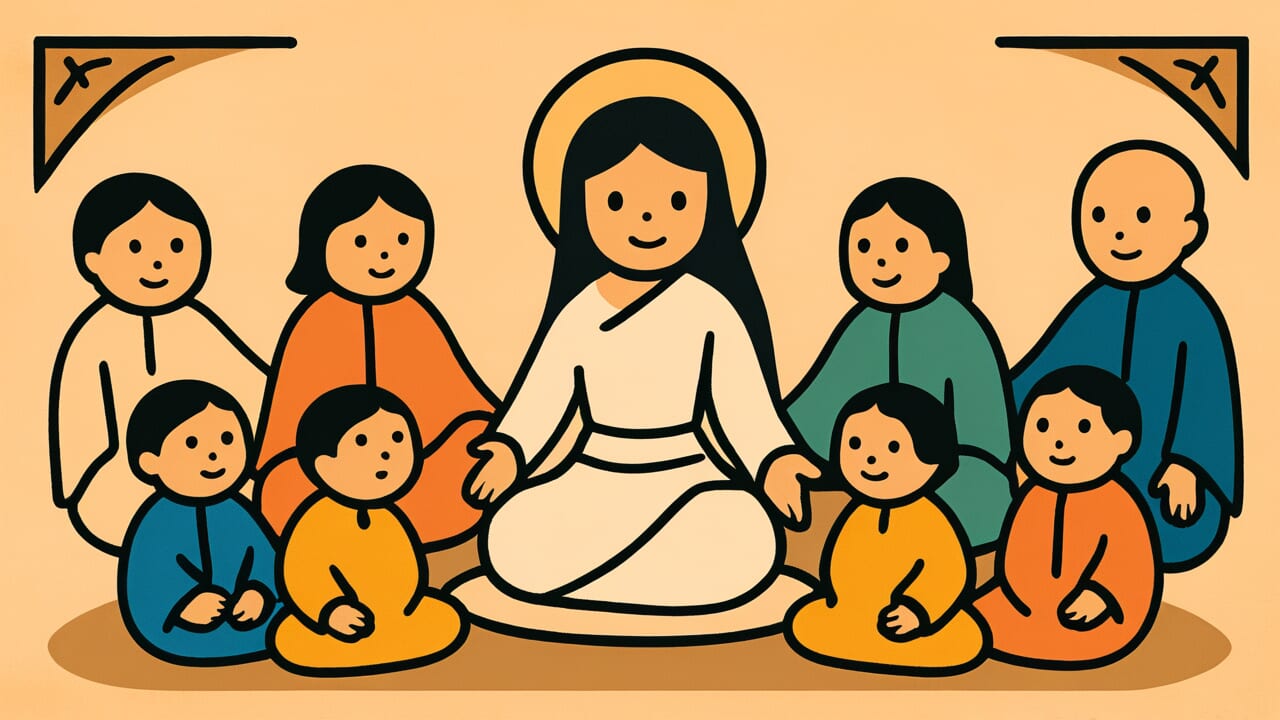How to Read “Before seven, a child of the gods”
Nanatsu mae wa kami no ko
Meaning of “Before seven, a child of the gods”
“Before seven, a child of the gods” means that children under seven years old are considered children of the gods and treated as special beings.
Children of this age were thought to not yet fully belong to human society. They were believed to exist in a sacred realm.
This proverb is used when expressing the innocence and purity of young children. It also appears when showing a tolerant attitude toward small children.
The saying suggests we should not judge children under seven by adult standards. Instead, we should treat them with special consideration.
Today, respecting children’s rights and individuality is the mainstream approach. But this proverb expresses children’s special nature from a different angle.
Young children have a unique world different from adults. The proverb teaches us to recognize and value their purity and mystery.
Origin and Etymology
The exact origin of this proverb in written sources has not been identified. However, it is deeply connected to traditional Japanese folk beliefs.
“Seven” refers to seven years old by the traditional counting method. In old Japan, children under seven were believed to not fully belong to the human world.
They were seen as existing at the boundary between the world of gods and this world. In an era when infant mortality was extremely high, reaching age seven safely was never guaranteed.
The Shichi-Go-San ceremony treats age seven as an important milestone. This connection relates to the same belief system.
Reaching seven meant a child was finally recognized as a member of human society for the first time.
The expression “child of the gods” carries a double meaning. It suggests children are still sacred and unpolluted beings.
At the same time, it reflects the anxiety that they might return to the world of gods at any moment. Parents raised children as precious gifts entrusted by the gods.
When a child safely reached seven, parents gave thanks to the gods. This way of thinking expressed both the preciousness and fragility of children’s lives.
It represents the deep wisdom of our ancestors.
Usage Examples
- My three-year-old grandchild is “before seven, a child of the gods,” so I overlook minor mischief
- “Before seven, a child of the gods,” they say, so maybe there’s deep meaning in the mysterious words small children speak
Universal Wisdom
The proverb “Before seven, a child of the gods” reveals a fundamental human perception. It captures our sense of something sacred in young children.
We feel a purity that seems not of this world.
When we gaze at babies and toddlers, we sense a mystery beyond words. Their clear eyes, innocent smiles, and unpredictable behavior hold something special.
There seems to be something adults have lost. Our ancestors expressed this feeling with the phrase “child of the gods.”
Behind this perception was also a fear of life’s fragility. Small lives that could be lost at any moment were treated as precious gifts from the gods.
By thinking this way, parents may have endured the pressure and anxiety of raising children.
At the same time, this proverb teaches tolerance toward children. Don’t judge them by adult standards before age seven.
This isn’t spoiling them. It’s wisdom that recognizes children have their own world.
Humans learn society’s rules as they grow. They acquire common sense and social understanding.
But perhaps the purity and intuitive sensitivity of early childhood shouldn’t really be lost. This proverb tells us across the ages to protect and respect the sacred quality in children.
When AI Hears This
Brain development has “critical periods” with time limits. These are windows when specific abilities can be acquired.
Interestingly, around age seven marks an important turning point in these critical periods.
Specifically, between ages six and seven, the prefrontal cortex develops rapidly. The prefrontal cortex controls judgment and self-control.
At the same time, “theory of mind” completes during this period. Theory of mind is the ability to understand that others have different thoughts and feelings from oneself.
In other words, around age seven, children begin to “become aware of others’ perspectives.”
What’s fascinating is that this change is irreversible. Once you pass through this developmental stage, you can’t go back.
Neural circuits physically reorganize themselves. The innocence and purity shown by children before seven isn’t just personality.
It comes from the brain’s structure itself.
Even more remarkable is that age seven is recognized as a “childhood milestone” in many cultures worldwide. Japan’s Shichi-Go-San, Catholic First Communion, and the Jewish education starting age all center around seven.
Modern neuroscience has proven a truth humanity knew experientially thousands of years ago.
Lessons for Today
This proverb teaches modern people to respect beings with different worldviews.
Modern society emphasizes efficiency and results. We tend to impose adult logic on children from an early age.
But “Before seven, a child of the gods” reminds us that young children have their own world. It teaches us to respect that world.
This isn’t just about raising children. New employees at work, people from different cultural backgrounds, elderly people.
Many people around us live in different cognitive worlds. Rather than judging these differences as immaturity or flaws, we should recognize their unique value.
Such tolerance is what today’s society needs.
This proverb also reminds us of the “child of the gods” part within ourselves. The purity, intuition, and playfulness we lost as adults.
Perhaps these qualities aren’t truly lost. They may just be sleeping deep in our hearts.
Sometimes returning to a child’s perspective to view the world brings new discoveries.



Comments